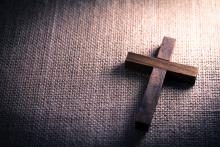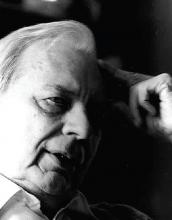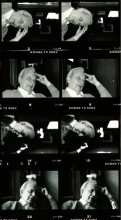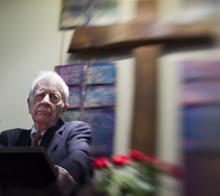Gordon Cosby

Mary Campbell Cosby, cofounder of the Church of the Saviour movement she launched with her husband and partner Rev. N. Gordon Cosby in the 1940s, died this week in Washington, D.C. She was 93 years old.
News of her passing spread quickly on July 3. Kayla McClurg sent an email to family and friends saying, “I am writing to let you know that our dear Mary Cosby passed away very gently and suddenly this afternoon at Christ House.”

The white ministers didn’t fly down to Alabama in January, when Sheriff Jim Clark clubbed Annie Lee Cooper outside of the county courthouse, nor in February when a state trooper fatally shot twenty-six-year-old Jimmie Lee Jackson in the stomach for trying to protect his mother after a civil rights demonstration.
But on Bloody Sunday everything changed. At 9:30 p.m. on March 7, 1965, ABC news interrupted a broadcast to show hundreds of black men, women, and children peacefully crossing the Edmund Pettus Bridge toward Montgomery and a sea of blue uniforms blocking their way. The marchers were given two minutes to disperse, and then the screen filled with the smoke of tear gas, police on horseback charging the screaming crowd, burly troopers wielding billy clubs and bullwhips, a woman’s hem rising up over her legs as a fellow marcher attempted to drag her away to safety.
Overnight the nation’s eye turned toward Selma. Rev. Martin Luther King sent a telegram to hundreds of clergy that Monday, urging them to leave their pulpits and join him in Alabama to march for justice. Some supporters, like the reporter George Leonard, packed their things immediately after watching the newscast from Selma.
“I was not aware that at the same momemt ... hundreds of these people would drop whatever they were doing,” Leonard wrote later.
“... That some of them would leave home without changing clothes, borrow money, overdraw their checking accounts, board planes, buses, trains, cars, travel thousands of miles with no luggage, get speeding tickets, hitchhike, hire horse-drawn wagons, that these people, mostly unknown to one another, would move for a single purpose to place themselves alongside the Negroes they had watched on television.”
Selma changed the course of history by paving the way for the passage of the Voting Rights Act, but its impact didn’t end there. The spirit of Selma rippled outward, forever changing those who made the long journey to Alabama — including a white minister from Washington, D.C., named Rev. Gordon Cosby.

This past year taught me so much about the gospel and caused me to go deeper into my faith. As this new year begins, here are five spiritual resolutions I learned from last year:
1. Return to the gospel. Gordon Cosby, the founder and pastor of The Church of the Saviour in Washington, D.C. passed away in early 2013. He was a mentor, elder, and spiritual director to me. I miss Gordon greatly and often have things I would like to talk with him about. But I usually know what he would say to me and it would always be about returning to the gospel. In his last sermon, spoken from his death bed, he spoke of Jesus’ “clear and frightening statement that the last shall be first and the first shall be last.”

GORDON COSBY was perhaps the most Christian human being I have known. But he would always be the first to raise serious questions about what it meant to be a “Christian” and lived a different life than many of his fellow pastors and church leaders who call themselves Christian. Gordon was happier just calling himself a follower of Jesus. He always told people who wanted to call him “reverend” to just say “Gordon.”

Last Wednesday morning, the Sojourners community lost an extraordinary friend with the passing of Gordon Cosby. In honor of the life and witness of this beloved brother of Christ, we offer this roundup of stories written by and about Gordon Cosby and his wife Mary.

Gordon Cosby was my spiritual father, not simply a brother in Christ. This relationship continued for some 45 years until his dying days. In a time when egalitarianism defines nearly all relationships as the desired norm, it’s well to remember the role of mentors who maintain, purely through their own internal integrity and faithfulness, a spiritual authority in the lives of others. Gordon Cosby was such a person to me, and to countless others.
I first encountered Gordon when I was a young legislative aide on the rise in Washington, D.C., working for Senator Mark O. Hatfield and his legislative efforts to end the Vietnam War. Disgusted with the moral vacuity of the evangelicalism that had been my heritage, but searching for faith that was more than just following a progressive social agenda, I discovered the Church of the Saviour. Gordon’s insistence that following Jesus required a disciplined inner spiritual journey always expressed in joining God’s outward mission in the world captivated me then, and ever since.

Gordon Cosby was perhaps the most Christian human being I have ever known. But he would always be the first to raise serious questions about what it meant to be a “Christian” and lived a very different kind of life than many of his fellow pastors and church leaders who call themselves Christian. Gordon was always happier just calling himself a follower of Jesus. He always told people who wanted to call him “Reverend” to just say “Gordon.”
At 4:15 Wednesday morning, Gordon went home into the arms of Jesus. At 94 years of age, he died in hospice at Christ House, a medical living community for the homeless, and one of the myriad of ministries formed by the Church of the Saviour in Washington, D.C., which Gordon and Mary Cosby founded in 1950.
Gordon Cosby and the Church of the Saviour were one of the most important reasons that Sojourners decided to come to Washington in 1975. And we have been spiritually intertwined ever since. For Sojourners, Gordon was a mentor, elder, inspirer, supporter, encourager, challenger, and retreat leader. For me, personally, he was a pastor and my most important spiritual advisor and director. Our countless times together provided me more wisdom, care, support, discernment, and direction than I ever found with anybody else. And never have I felt more prayers for me from anyone than I did from Gordon Cosby, especially in the closing years of his life.
